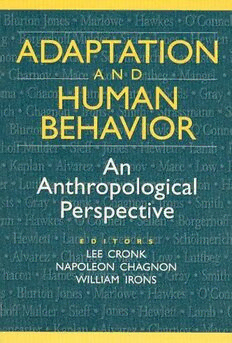
Adaptation and Human Behavior: An Anthropological Perspective (Evolutionary Foundations of Human Behavior) PDF
529 Pages·2002·39.526 MB·English
Most books are stored in the elastic cloud where traffic is expensive. For this reason, we have a limit on daily download.
Preview Adaptation and Human Behavior: An Anthropological Perspective (Evolutionary Foundations of Human Behavior)
Description:
Adaptation and Human Behavior is a collection of state-of-the-art studies in the rapidly growing field of human behavioral ecology. It commemorates the birth of this approach two decades ago with the publication of Chagnon and Irons's edited volume Evolutionary Biology and Human Social Behavior: An Anthropological Perspective. At the same time it redefines human behavioral ecology for a new generation of scholars and students. Following a set of introductory chapters that put the volume in broader historical and theoretical context, eighteen chapters use data from more than twenty different human societies to explore human behavioral adaptations. A final chapter looks at how far the approach has come and where it may go. Well-known human behavioral ecologists as well as a younger generation of scholars approach topics with a degree of theoretical and methodological sophistication that demonstrate both the maturity and freshness of this new paradigm in the study of human behavior. CONTENTS Preface · Part I. Some Statements of Theory · 1. Two Decades of a New Paradigm, William Irons · 2. Three Styles in the Evolutionary Analysis of Human Behavior, Eric Alden Smith · Part II. Mating · 3. Polygyny, Family Structure, and Child Mortality: A Prospective Study among the Dogon of Mali, Beverly I. Strassman · 4. Paternal Investment and Hunter-Gatherer Divorce Rates, Nicholas Blurton Jones, Frank W. Marlowe, Kristen Hawkes, and James F. O'Connell · 5. Fertility, Offspring Quality, and Wealth in Datoga Pastoralists: Testing Evolutionary Models of Intersexual Selection, Daniel W. Sellen, Monique Borgerhoff Mulder, and Daniela F. Sieff · 6. Manipulating Kinship Rules: A Form of Male Yanomam? Reproductive Competition, Napoleon Chagnon · 7. Physical Attractiveness, Race, and Somatic Prejudice in Bahia, Brazil, Douglas Jones · Part III. Parenting · 8. Parental Investment Strategies among Aka Foragers, Ngandu Farmers, and Euro-American Urban Industrialists, Barry S. Hewlett, Michael E. Lamb, Birgit Leyendecker, and Axel Sch?lmerich · 9. Parenting Other Men's Children: Cost, Benefits, and Consequences, Jane B. Lancaster and Hillard S. Kaplan · 10. Female-Biased Parental Investment and Growth Performance among the Mukogodo, Lee Cronk · 11. The Grandmother Hypothesis and Human Evolution, Kristen Hawkes, James F. O'Connell, Nicholas Blurton Jones, H. Alvarez, and E.L. Charnov · 12. Why Do the Yomut Raise More Sons than Daughters? William Irons · Part IV. The Demographic Transition · 13. An Adaptive Model of Human Reproductive Rate Where Wealth Is Inherited: Why People Have Small Families, Ruth Mace · 14. Skills-Based Competitive Labor Markets, the Demographic Transition, and the Interaction of Fertility and Parental Human Capital in the Determination of Child Outcomes, Hillard S. Kaplan and Jane B. Lancaster · 15. Sex, Wealth, and Fertility: Old Rules, New Environments, Bobbi Low · 16. To Marry Again or Not: A Dynamic Model for Demographic Transition, Barney Luttberg, Monique Borgerhoff Mulder, and Marc Mangel · Part V. Sociality · 17. Effects of Illness and Injury on Foraging among the Yora and Shiwiar: Pathology Risk as Adaptive Problem, Lawrence Sugiyama and Richard Chacon · 18. Reciprocal Altruism in Yanomam? Food Exchange, Raymond Hames · 19. Reciprocal Altruism and Warfare: A Case from the Ecuadorian Amazon, John Q. Patton · 20. The Emergence and Stability of Cooperative Fishing on Ifaluk Atoll, Richard Sosis · Part VI. Conclusion · 21. Twenty Years of Evolutionary Biology and Human Social Behavior: Where Are We Now? J. Patrick Gray · References · Index
See more
The list of books you might like
Most books are stored in the elastic cloud where traffic is expensive. For this reason, we have a limit on daily download.
